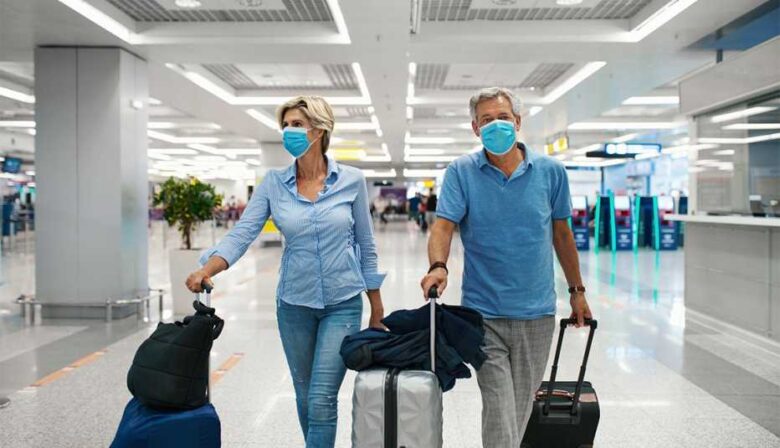Getting sick on vacation is the worst thing that can ruin an otherwise fantastic trip. Whether it’s from street food or exhaustion after a long journey, getting sick abroad can make your trip even harder. You can prevent many travel illnesses by thinking ahead and practicing good hygiene. You don’t have to go to great lengths to stay healthy while traveling; you just need to be well-informed and plan. The right habits can help you stay energized and enjoy every moment of your trip. These habits include drinking enough water and knowing what to eat. You shouldn’t compromise your health while traveling. These simple, smart tips will help you relax and increase your chances of a safe, illness-free trip. Here’s how to stay healthy, wherever you go.
Drink Safe Water and Stay Hydrated:
One of the most important things you can do to stay healthy while traveling is to stay hydrated. When you’re on a plane, walking around a city, or hiking in the heat, your body loses fluids faster than normal. Not drinking enough water can make you feel tired, give you a headache, or cause foggy thoughts. These can all be confused with travel fatigue or jet lag. But tap water is not safe in many places, and that’s where things get complicated. Always check to make sure the water is safe to drink before you travel. If not, use bottled water and make sure it’s sealed properly. Don’t add ice to your drinks, and be careful with fruits and vegetables that have been washed in tap water. Want to stay healthy and hydrated while you travel? Consider bringing a reusable water bottle with a built-in filter. One of the easiest ways to stay healthy is to watch your water.
Choose Safe Foods and Eat Wisely:
One of the joys of traveling is sampling local food, but it can also be harmful to your health. Not all vendors keep their stalls clean, and new bacteria can give you a stomachache. Choose vendors that are frequented by locals. This usually means the food is fresh and safe. For meat and fish, it’s best to eat hot food rather than raw. Be extra careful unless you can see street food being freshly prepared. A simple but effective habit is to carry hand sanitizer and wash your hands before eating. If you have a sensitive stomach, you can carry probiotics or digestive enzymes. Food poisoning is a common illness that people get while traveling, but it can be prevented with the right measures.
Get Enough Sleep and Rest:
Traveling can disrupt your schedule, especially when it comes to sleeping. Lack of sleep can make you more susceptible to illness, whether it’s from jet lag, a busy schedule, or noisy accommodations. Make sure you get enough sleep, especially in the first few days of your trip. If you’re traveling to a different time zone, try to adjust your sleeping habits a few days before you leave. Bring a neck pillow, earplugs, and a sleep mask to make it easier to fall asleep on the plane. Don’t try to do too much at once; make sure you take some time for yourself during your trip. A nap can help you replenish your energy. Getting enough sleep is essential for staying healthy while traveling. It gives you a clear mind and energy to enjoy your trip.
Pack a Travel Health Kit:
Having your own small first aid kit can save you a lot of aches and pains while traveling. It should contain pain relievers, antacids, antihistamines, Band-Aids, and any prescription medications. Also pack supplies such as anti-diarrhea medications, rehydration salts, and motion sickness medications. These can be hard to find abroad or in case of an emergency. If you wear contact lenses or take daily medications, make sure you have some backup items in your carry-on in case your luggage gets lost. A thermometer, hand sanitizer, and bug spray are also handy. If you’re traveling to a faraway country, pack some basic wound care products and a spare pair of glasses. You don’t want to have to search for a pharmacy in the middle of the night or in a country where you don’t speak the language. Your health pack is like a safety net: you hope you never need it, but if you do, you’re glad you have it.
Maintain Hygiene Wherever You Are:
You will touch many things during your travels, such as airport handrails, taxi handles, doorknobs, and public restrooms. You can always pick up germs that can make you sick without even realizing it. That’s why it’s important to maintain basic hygiene habits. Wash your hands regularly, especially before eating and after using the restroom. If soap and water are not available, you can use an alcohol-based hand sanitizer. Avoid touching your face, especially your eyes, nose, and mouth, as these are easy places for viruses to enter. Don’t leave your phone or wallet on the floor of a public restroom. Also, wipe down the armrests and tables on the plane before using them. These are some of the dirtiest places on the plane. Keep some tissues or disinfectant wipes in your bag for a quick clean. These little things may seem simple, but they can help you stay healthy while traveling.
Stay Away from the Sun and Insects:
Excessive sun exposure or insect bites can make you sick while traveling. Sunburns are not only painful but can also cause fever, dehydration, and an increased risk of skin cancer. Wear sunscreen with at least SPF 30 and reapply throughout the day. Wear a hat and sunglasses and cover up during the hottest part of the day. Mosquitoes can spread diseases such as malaria or dengue fever in tropical or rural areas. Sleep under a mosquito net if necessary and use insect repellent with DEET or other recommended chemical ingredients. Wear long sleeves and pants when traveling in areas with high insect infestations, especially at dawn and dusk. These tips can help you avoid getting sick or experiencing severe pain during your trip.
When to See a Doctor:
Even if you take all the right precautions, you can still get sick while traveling. Don’t ignore symptoms that get worse or don’t improve after a day or two. See a doctor immediately if you have symptoms such as high fever, severe diarrhea, dehydration, or chest pain. Before you leave, find a clinic or hospital near your destination and write down their contact details. If you have travel insurance, make sure you understand how to file a claim and what coverage is provided. There are many English-speaking doctors and travel clinics in major cities. Don’t let severe symptoms get to you for too long, or your condition could worsen. Knowing when to seek help is not a sign of weakness but a smart and important way to ensure a safe trip.
Conclusion:
Traveling can broaden your horizons, cheer you up, and create memories that will last a lifetime. But it can be hard to enjoy your trip if you’re sick. Don’t forget your health when planning your trip. Little things like drinking clean water, carrying a first aid kit, and staying away from insects and the sun can make a huge difference. You don’t have to sacrifice fun or adventure to stay healthy while traveling. All you need to do is make smart choices so you can enjoy every moment and avoid hassles. The following eight tips can help you avoid illness and make your trip smoother and safer. Take care of your body, stay alert, and don’t let anything get in the way of enjoying your trip to the fullest. The ideal way to travel is to travel safely and healthily.
FAQs:
1. What are the most common illnesses that travelers suffer from?
One of the most common illnesses is traveler’s diarrhea, which is usually caused by unclean food or water.
2. Should I see a doctor before traveling?
Yes, especially if you are traveling to less developed countries or need vaccinations that are only available locally.
3. Is it safe to drink tap water during your trip?
This depends on your location. Check in advance. If you are unsure, drink bottled or filtered water.
4. How can you avoid mosquito-borne diseases?
If necessary, use insect repellent, wear long-sleeved clothing, and sleep under a mosquito net.
5. What should I do if I get sick during my trip?
If symptoms are severe, consult a doctor immediately. If necessary, contact your travel insurance company and the embassy in your region.




